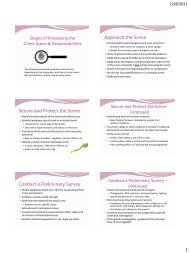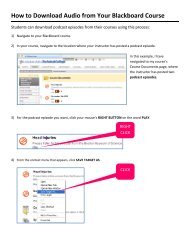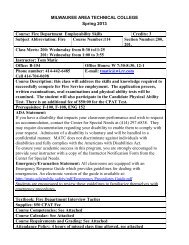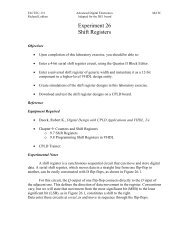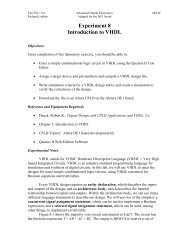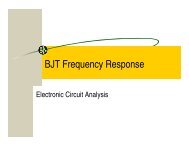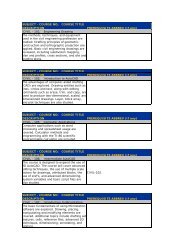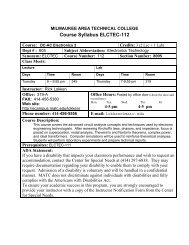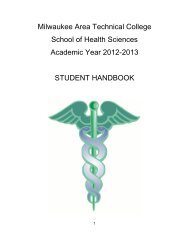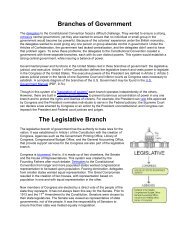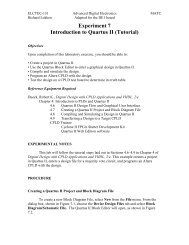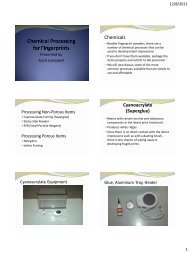WI Forward Award 2012 - Welcome to MATC - Milwaukee Area ...
WI Forward Award 2012 - Welcome to MATC - Milwaukee Area ...
WI Forward Award 2012 - Welcome to MATC - Milwaukee Area ...
You also want an ePaper? Increase the reach of your titles
YUMPU automatically turns print PDFs into web optimized ePapers that Google loves.
Measure, Analysis & Knowledge Management: Category 4<br />
Figure 4-1b: Data Sources and Information Access by Segment Groups (continued)<br />
Focus Stakeholder Resource Hard Copy Face-<strong>to</strong>-Face<br />
Community Leaders<br />
& Partners / Employers<br />
• College’s website<br />
• TechConnect website<br />
• Annual Report/ <strong>MATC</strong> Foundation<br />
Annual Report<br />
• President’s Communique newsletter<br />
• Annual CAFR Report<br />
• District Board meetings, agendas,<br />
committees<br />
• ECAM Viewbook<br />
• Graduate Employment Report<br />
• Annual Report<br />
• ECAM Viewbook<br />
• <strong>MATC</strong> Foundation Annual Report<br />
• Centennial S<strong>to</strong>ries<br />
• OWED Viewbook<br />
• Surveys and other research reports<br />
• District Board meetings, agendas,<br />
committees<br />
• Program Advisory Committee<br />
meetings<br />
• High School Recruitment programs<br />
• Pre-College/CBO meetings<br />
• Job fairs<br />
• Community meetings<br />
External<br />
Graduates<br />
• Alumni Linkedin Foundation Acct. • Centennial S<strong>to</strong>ries • Alumni events<br />
• Job fairs<br />
• Program Advisory Committee<br />
meetings<br />
General Public<br />
• College’s website<br />
• WTCS website<br />
• District Board meetings, agendas,<br />
committees<br />
• Graduate Employment Report<br />
• Centennial S<strong>to</strong>ries<br />
• District Board meetings, agendas,<br />
committees<br />
• Community meetings<br />
Accrediting Body<br />
• Website<br />
• AQIP Systems Portfolio<br />
• Fast<strong>Forward</strong>/Baldrige Application<br />
• 3rd party accreditation reports<br />
• Federal Compliance<br />
• Quality check-up visit<br />
• Additional site visits<br />
Board (Figure P-2b). The data is checked for accuracy, combined<br />
with those from the other 15 colleges of the district, and posted<br />
as public reports on the WTCS website or created as documents<br />
for dissemination <strong>to</strong> the college leadership. The data provide state<br />
institutional comparisons each fiscal year that cover enrollments<br />
and student characteristics, graduate employment, grant<br />
performance, program and curriculum performance, budgets and<br />
finances, facilities updates and performance, and more.<br />
At the same time, institutional performance on enrollments,<br />
student performance, campus climate, and student and employee<br />
satisfaction is compared every two years <strong>to</strong> both national and<br />
urban peer institutions on an array of indica<strong>to</strong>rs, depending<br />
on the specific survey. <strong>MATC</strong> employs national surveys by<br />
Noel Levitz (Figures 7-1s and 7-2a), NILIE, and the CCSSE<br />
for that purpose. A community perception survey conducted<br />
every six years generates residents’ comparative assessments<br />
of metro two- and four-year colleges on their perceived quality<br />
of education, their percentage of market share, and prospects’<br />
preferences in colleges (Figures 7-2b and 7-2c). For finances,<br />
NACUBO averages will be used on Finance dashboards in <strong>2012</strong>,<br />
showing college performance on the reserve ratio, net income<br />
ratio, institutional viability ratio, and return on assets ratio.<br />
4.1.a(3) Student & Stakeholder Data<br />
Vehicles for listening <strong>to</strong> students and stakeholders are shown<br />
in Figures 3-1c and 3-1d. The information these mechanisms<br />
gather and the relevancy of measures used <strong>to</strong> assess institutional<br />
health are discussed by the President, EVP/Provost, and the<br />
IRSP direc<strong>to</strong>r. For example, the decisions <strong>to</strong> reinstitute the PACE<br />
climate survey after nine years, <strong>to</strong> initiate the CCSSE student<br />
engagement survey for the first time, <strong>to</strong> drop the Noel Levitz IPS<br />
after four years of use, and continue the Noel Levitz SSI after<br />
six years were made in fall 2011. We based these decisions on<br />
ensuring that the most relevant measures based on student and<br />
employee feedback for reporting purposes were being used—both<br />
for high-level organizational assessments as well as for long-term<br />
KPI–tracking on the Strategic Plan and its action projects.<br />
Student feedback is accumulated on a regular basis, often around<br />
specific issues tied <strong>to</strong> college projects. For example, Student<br />
Life runs focus groups each semester around campus issues<br />
while a Transfer Equity study sponsored by the University of<br />
Southern California included minority student focus groups<br />
<strong>to</strong> explore barriers and supports on campus for transferring <strong>to</strong><br />
four-year colleges and universities. Between the fall 2010 and<br />
spring <strong>2012</strong> terms, the following issues were covered through<br />
student discussion sessions conducted by Student Life: grade<br />
appeal procedure review; <strong>to</strong>bacco-free campuses; Side Share;<br />
consumer preferences: Coke vs. Pepsi; IT issues; Academic<br />
Support Services; Public Safety issues; name selection for café/<br />
grab-and-go service; college advertisements; student discussion<br />
opportunity with the President; van shuttle use; books<strong>to</strong>re, and<br />
operation hours of the gym.<br />
In the past two years, students also provided face-<strong>to</strong>-face<br />
feedback <strong>to</strong>: The Higher Learning Commission; SPBSC; sessions<br />
involving candidates for the vice president of Student Services<br />
position; sessions involving candidates for the manager of Student<br />
Life position; Facility Master Planning representatives; the ad hoc<br />
committee on Student Accommodating Services; the Legislative<br />
Task Force; Academic Support Services staff, and the Physical<br />
Education Department.<br />
Additionally, focus groups and discussion sessions are conducted<br />
on issues of importance for improving operations. For example,<br />
focus groups on the use of procurement cards were run in<br />
<strong>2012</strong>. Small-group discussion <strong>to</strong>pics for academic staff at<br />
Provost Council meetings in 2011-12 emerged from findings of<br />
21



